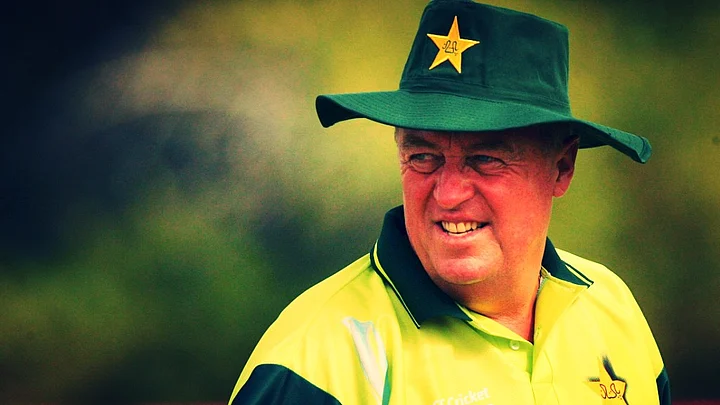The Pakistan cricket team had just lost to the Irish team on the St Patrick’s Day (17 March) in their second group match of the 2007 World Cup in the Caribbean. Their second loss in as many matches.
But the biggest shock of the World Cup was yet to happen.
Bob Woolmer, the coach of the Pakistan cricket team, was found dead in his hotel room in Jamaica on 18 March.
And all hell broke loose.
What Had Happened?
Woolmer’s body was found lying naked on his back with his legs spread apart in the early hours of 18 March in the bathroom of room number 374, on the 12th floor of the Jamaica Pegasus hotel.
He had blood in his mouth and the walls were splattered with vomit. It wasn’t a hidden fact that Woolmer was far from being healthy, was on medication for diabetes and had just lost one of the most important matches of his career.
Keeping in mind his medical history and the circumstances preceding his death, it was widely assumed that he had suffered a heart attack, though there were murmurs, too, that he had committed suicide.
The grandeur of the World Cup had taken a backstage. The more important topic was who killed Bob Woolmer? At that time it felt as if anyone might have murdered him, and that there were many who wanted him dead.
Conspiracy Theories
There were fresh theories doing the rounds everyday at a rapid pace. The murderer could have been an enraged Pakistan fan or may be a cricket mafia. Even the Pakistan team captain was not spared. A terrorist plot by Islamic extremists. An underworld bookmaker who had lost millions.
The probe by the Jamaican Police only increased the mystery surrounding the death.
The man leading the investigation was British-born Mark Shields, the then deputy commissioner of Jamaican police.
On 21 March, the police stated the initial findings of the autopsy were “inconclusive”, and announced they were treating Woolmer’s death as suspicious. Three days later, the case took the most bizarre turn. An emergency press conference was called and it was declared that Woolmer was murdered, the exact cause of death was ‘asphyxia as a result of manual strangulation.’
The same day, the Pakistan team were preparing to board a flight to London. Moments before take-off, something extraordinary happened: Team captain Inzamam-ul-Haq, assistant coach Mushtaq Ahmed and team manager Talat Al were asked to step to one side for questioning over alleged ‘ambiguities’ in their statements only to be released later that night.
Following this, reports surfaced of a row between Woolmer and his players on the team bus after the Ireland defeat.
Final Conclusion
The detectives in Jamaica were not at all convinced with the murder theory. Officers who first entered Woolmer's bathroom on 18 March had concluded, from what they saw, that he was not murdered.
They didn’t find any marks on him. Neither were there any sign of a struggle. Many officers believed that there wasn’t a murder angle, only to be overruled by a senior officer. This was followed by a shoddy forensic investigation.
In addition, there were evidences which indicated that Woolmer’s health was worsening.
Finally, on 12 June, the Jamaican Constabulary Force announced that Woolmer had in fact died of natural causes and that it was not a murder.
Woolmer’s Legacy
In 1982, Woolmer was part of a rebel tour of apartheid South Africa, led by Graham Gooch, which defied the British government's policy of sporting isolation for South Africa. Subsequently, he was banned from playing for England for three years, ending his international career at the age of 33.
From there he came a long way to coach South Africa in 1994 at a time when the side was moving from an all-white team to one that integrated both black and white. It was Woolmer who had turned the country into one of the toughest international teams.
Woolmer’s love for innovation and technology was evident. He was one of the first coaches in world cricket to introduce laptops and computer programmes to his players. In fact, it was Woolmer who had asked the then captain Hansie Cronje to wear a small earpiece to allow him to hear instructions from the dressing room, for which Cronje was reprimanded by the ICC.
Woolmer was the coach of the South African team which got embroiled in a match-fixing saga in 2000. He stepped down after that.
Woolmer was way ahead of his time with his coaching innovation and loved challenges. The Pakistan job, which he took in 2004, tested even Woolmer's love for a challenge and may be the stress that comes with working with a South Asian team got the better of him.
(The Quint is now on WhatsApp. To receive handpicked stories on topics you care about, subscribe to our WhatsApp services. Just go to TheQuint.com/WhatsApp and hit Send.)
(At The Quint, we question everything. Play an active role in shaping our journalism by becoming a member today.)
